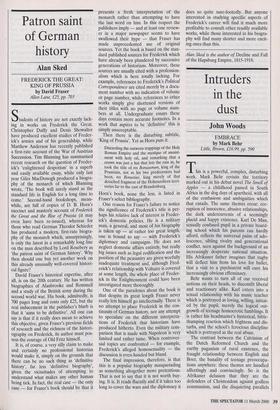Patron saint of German history
Alan Sked
FREDERICK THE GREAT: KING OF PRUSSIA by David Fraser Allen Lane, £25, pp. 703 Students of history are not exactly lack- ing in works on Frederick the Great. Christopher Duffy and Denis Showalter have produced excellent studies of Freder- ick's armies and of his generalship, while Matthew Anderson has recently published a first-rate account of the War of Austrian Succession. Tim Blanning has summarised recent research on the question of Freder- ick's 'enlightened despotism' in a superb and easily available essay, while only last year Giles MacDonogh produced a biogra- phy of the monarch of which Blanning wrote, 'The book will surely stand as the standard life in English for a long time to come.' Second-hand bookshops, mean- while, are full of copies of D. B. Horn's succinct and masterly account of Frederick the Great and the Rise of Prussia (it may even have been re-issued), whereas for those who read German Theodor Schieder has produced a modern, first-rate biogra- phy of the monarch which, unsurprisingly, is only the latest in a remarkably long line on the man described by Lord Rosebery as `the patron saint of German history'. Why then should one buy yet another work on this already unusually well-covered histori- cal figure? David Fraser's historical expertise, after all, is on the 20th century. He has written biographies of Alanbrooke and Rommell and a study of the British army during the second world war. His book, admittedly, is 700 pages long and costs only £25, but the real inducement in the publisher's blurb is that it 'aims to be definitive'. All one can say is that if it really does mean to achieve this objective, given Fraser's previous fields of research and the richness of the histori- ography on Frederick, its author must pos- sess the courage of Old Fritz himself. It is, of course, a very silly claim to make and certainly no professional historian would make it, simply on the grounds that there can be no such thing as 'definitive history', far less 'definitive biography', given the vicissitudes of attempting to understand what makes any other human being tick. In fact, the real case — the only case — for Fraser's book should be that it presents a fresh interpretation of the monarch rather than attempting to have the last word on him In this respect the publishers imply — and at least one review- er in a major newspaper seems to have swallowed their hype — that Fraser has made unprecedented use of original sources. Yet the book is based on the stan- dard published sources for Frederick which have already been plundered by successive generations of historians. Moreover, these sources are usually cited with a profession- alism which is here totally lacking. For example, references to Frederick's Political Correspondence are cited merely by a docu- ment number with no indication of volume or page number, while references to other works simply give shortened versions of their titles with no page or volume num- bers at all. Undergraduate essays these days contain more accurate footnotes. In a work that aspires to be 'definitive' this is simply unacceptable. Then there is the disturbing subtitle, `King of Prussia'. Yet as Horn puts it: Discarding the outworn trappings of the Holy Roman Empire and the mystique of anoint- ment with holy oil, and remarking that a crown was just a hat that lets the rain in, he took the title of rex Borussorum, king of the Prussians, not as his two predecessors had been, rex Borussiae, king merely of that detached fragment of the Hohenzollern terri- tories far to the east of Brandenburg.
Horn's book, none the less, is listed in Fraser's select bibliography. One reason for Fraser's failure to notice the significance of Frederick's title is per- haps his relative lack of interest in Freder- ick's domestic policies. He is a military man, a general, and most of his biography is taken up — at rather too great length, one is bound to say — with Frederick's diplomacy and campaigns. He does not neglect domestic affairs entirely, but really big issues such as legal codification and the position of the peasantry are given woefully inadequate treatment and, although Fred- erick's relationship with Voltaire is covered at some length, the whole place of Freder- ick in the Enlightenment could have been investigated more thoroughly. One of the paradoxes about the book is that despite its great length Fraser never really lets himself go intellectually. There is no attempt to place Frederick in the con- tinuum of German history, nor any attempt to speculate on the different interpreta- tions of Frederick that historians have produced hitherto. Even the military com- parison that is made with Napoleon is very limited and rather tame. When controver- sial topics are confronted — for example, Frederick's alleged homosexuality — the discussion is even-handed but bland.
The final impression, therefore, is that this is a popular biography masquerading as something altogether more pretentious. That is not to say that it is not worth buy- ing. It is. It reads fluently and if it takes too long to cover the wars and the diplomacy it does so quite sure-footedly. But anyone interested in studying specific aspects of Frederick's career will find it much more profitable to consult other readily available works, while those interested in his biogra- phy will find many shorter and more excit- ing ones than this.
Alan Sked is the author of Decline and Fall of the Hapsburg Empire, 1815-1918.


































































 Previous page
Previous page